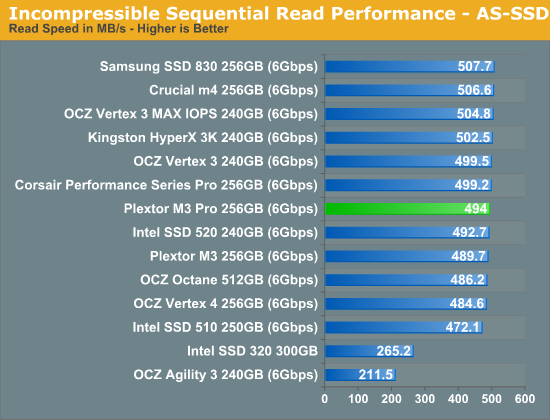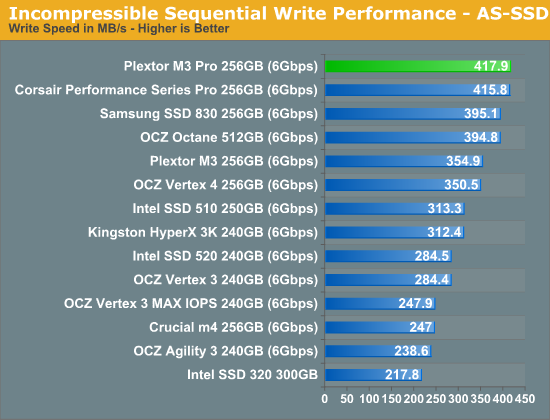Plextor M3 Pro (256GB) Review
by Kristian Vättö on July 1, 2012 1:45 PM ESTAS-SSD Incompressible Sequential Performance
The AS-SSD sequential benchmark uses incompressible data for all of its transfers. The result is a pretty big reduction in sequential write speed on SandForce based controllers, while other drives continue to work at roughly the same speed as with compressible data.

As I've said before, incompressible sequential read speed testing is very unsurprising nowadays to say the least, and the M3 Pro doesn't make an exception. It's 4.3MB/s (0.9%) faster than the M3 but when that is translated into percentages, we're essentially within the margin of error.

Incompressible sequential write performance, on the other hand, is another story. The M3 Pro comes out as the fastest drive we have tested, although it beats Corsair Performance Series Pro by only 2.1MB/s. However, the difference between the M3 and M3 Pro is 63MB/s (~18%), which is fairly significant.










55 Comments
View All Comments
Coup27 - Sunday, July 1, 2012 - link
I agree. I welcome another SSD toolbox into the mix, but with its current feature set, it is largely pointless. Manual TRIM for a toolbox utility is essential.I presume that Samsung make Toshiba's NAND for them? I did not know that.
Kristian Vättö - Sunday, July 1, 2012 - link
Samsung and Toshiba both make their own NAND. Toshiba does have a joint venture with SanDisk though (similar to what Intel and Micron are doing).Coup27 - Monday, July 2, 2012 - link
"The NAND is once again from Toshiba and there are a total of eight NAND packages on the PCB. These are 32GiB quad-die packages and are manufactured using Samsung's 24nm process"I don't understand this then?
Kristian Vättö - Monday, July 2, 2012 - link
That's a typo/error. Fixed now :-)csroc - Sunday, July 1, 2012 - link
At least the author knows who Plextor is this time!pheadland - Sunday, July 1, 2012 - link
OCZ also has an SSD toolbox, and it more functionality than the Plextor one.Belard - Monday, July 2, 2012 - link
Last time I checked... its just a ROM/FIRMWARE upgrade tool.Hence, I buy and tell friends to get Intel drives. I'll gladly pay the extra $20~30 for the reliability, support and upper-class performance. Sure its NOT #1, but I'll take a slight performance hit over BSODs and full out failures.
I had to explain to a client his SSD that Dell installed in his high end Dell is a Samsung that doesn't support TRIM... its new enough to be SATA3/6Gbs - and yet its performance is already SLOWER than my own intel G2 M25 drive (SATA 2).
The Intel tool box if full featured. 3.0x is quite nice.
KAlmquist - Sunday, July 1, 2012 - link
I ask because the write performance of SSD's can vary a lot depending on how full the drive is. The Vertex 4 even uses a different block allocation algorithm if the drive is less than half full.Kristian Vättö - Sunday, July 1, 2012 - link
Storage Bench is run on a clean drive.KAlmquist - Monday, July 2, 2012 - link
So it measures how the drives perform when they have a lot of free space. Thanks.